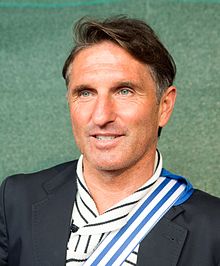 Labbadia in 2016 | |||
| Personal information | |||
|---|---|---|---|
| Date of birth | 8 February 1966 | ||
| Place of birth | Darmstadt, West Germany | ||
| Height | 1.78 m (5 ft 10 in) | ||
| Position(s) | Striker | ||
| Youth career | |||
| 1972–1976 | FSV Schneppenhausen | ||
| 1977–1983 | SV Weiterstadt | ||
| 1983–1984 | Darmstadt 98 | ||
| Senior career* | |||
| Years | Team | Apps | (Gls) |
| 1984–1987 | Darmstadt 98 | 105 | (44) |
| 1987–1988 | Hamburger SV | 41 | (11) |
| 1988–1991 | 1. FC Kaiserslautern | 67 | (20) |
| 1991–1994 | Bayern Munich | 82 | (28) |
| 1994–1995 | 1. FC Köln | 41 | (15) |
| 1995–1998 | Werder Bremen | 63 | (18) |
| 1998–2001 | Arminia Bielefeld | 98 | (50) |
| 2001–2003 | Karlsruher SC | 60 | (18) |
| Total | 557 | (204) | |
| International career | |||
| 1987 | West Germany U-21 | 6 | (3) |
| 1992–1995 | Germany | 2 | (0) |
| Managerial career | |||
| 2003–2006 | Darmstadt 98 | ||
| 2007–2008 | Greuther Fürth | ||
| 2008–2009 | Bayer Leverkusen | ||
| 2009–2010 | Hamburger SV | ||
| 2010–2013 | VfB Stuttgart | ||
| 2015–2016 | Hamburger SV | ||
| 2018–2019 | VfL Wolfsburg | ||
| 2020–2021 | Hertha BSC | ||
| 2022–2023 | VfB Stuttgart | ||
| *Club domestic league appearances and goals | |||
Bruno Labbadia (pronounced [labbaˈdiːa]; born 8 February 1966) is a German football manager and former professional player who played as a striker. During his playing career, he achieved notable success, winning the DFB-Pokal in the 1989–90 season with 1. FC Kaiserslautern and the Bundesliga title in 1993–94 with FC Bayern Munich. Labbadia also earned two caps for the German national team, representing his country at the international level.
As a manager, Labbadia has coached several Bundesliga clubs, most recently VfB Stuttgart. He was considered for the role of head coach of the Nigeria national football team, but ultimately declined the position. Labbadia is well-regarded for his ability to stabilize teams facing relegation challenges, making him a prominent figure in German football management.[1]
- ^ "Paukenschlag: Labbadia sagt Nigeria ab". kicker.de (in German). 30 August 2024. Retrieved 30 August 2024.